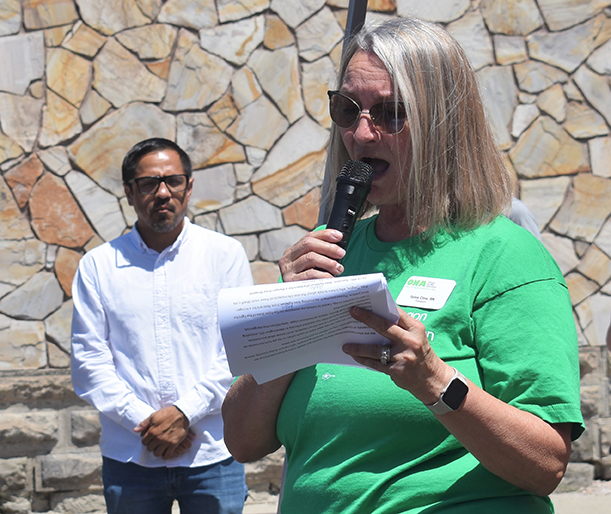A Call For Change
Published 7:30 am Saturday, December 9, 2017

- S. John Collins / Baker City HeraldMariana Rosales has been working at the Chaves Consulting call center off and on since 2015. Nov. 30 was her last day of employment.
A Baker City couple who as recently as July employed 53 people through a state contract had to lay off their remaining call center workers at the end of November when state officials declined to extend the contract for handling calls related to the Oregon Health Plan.
Richard and Kathleen Chaves, owners of Chaves Consulting, said they have all but given up on acquiring state contracts for their call center and will focus instead on securing deals with private firms.
“It was heartbreaking to meet with our employees the Monday after Thanksgiving and tell them that despite their doing everything the state asked them to do, to consistently exceed state measurements at a cost significantly less than state call center employees, they would be losing their jobs in the middle of the holiday season,” Kathleen Chaves said.
Charlotte Coombes, who worked at the Baker City call center, said she would gladly return to the business if that were possible.
“Leaving Chaves is something I pray is a short-term respite,” Coombes said, “because I would come back as the cleaning lady just to have the opportunity to stay with this amazing group.”
The state’s decision to not extend Chaves Consulting’s most recent 90-day contract is the latest in a nearly year-long series of frustrating episodes for the company, who employed people from both Baker and Union counties.
The Chaveses contend that state officials are focused on hiring public employees, most of whom work in the Willamette Valley, rather than on outsourcing tasks to private companies in Baker City and other rural areas with higher unemployment rates.
In a Tuesday email to the Chaveses, Berri Leslie, deputy chief of staff for Oregon Gov. Kate Brown, wrote that federal rules allow private contractors to do only certain types of work related to whether people qualify for Medicaid (Oregon Health Plan).
Although the Chaves Consulting employees helped people with their Medicaid applications, only state employees are authorized to “process these applications and determine eligibility,” Leslie wrote.
“We understand that your employees also did a great job making call outs to remind clients to renew,” Leslie wrote.
Richard Chaves contends that his company’s call center workers have done the eligibility determinations that Leslie cited in the email.
But even if state officials now decide, based on federal rules, that only state employees can do that work, Chaves argues that there are other tasks private contractors could do — and at a lower cost to taxpayers.
“The state has never given us something that we didn’t excel at,” Chaves said. “What it comes down to, in my opinion, is do you want to outsource some of this work. The state is saying no.”
The Chaveses’ frustrations started almost a year ago.
Their company, which secured its first state contract 11 years ago, had a one-year, $2.5 million call center contract with the Oregon Health Authority (OHA) that expired Jan. 31, 2017. The company employed 54 people to handle that contract, which included five optional one-year renewals.
But OHA officials declined to extend the contract, and at the end of January, Chaves Consulting laid off the 54 employees.
At that time, state officials said they decided not to continue the contract because the need for call center work had declined, and because the state was facing a nearly $2 billion budget deficit.
The Chaveses pointed out that although they paid their employees a minimum of $12 per hour and offered health, dental and vision insurance along with a retirement plan, their costs were still roughly half what the state spends for each public employee at state-run call centers.
(With the 90-day contracts workers weren’t eligible for benefits, Richard Chaves said, so the company increased its base wage to $13 per hour.)
The Chaveses have also cited what they considered inconsistencies between Brown’s statements and the state’s actions. During her inaugural address in January, the governor vowed that Oregon “must bust open the doors of opportunity so that individuals can find good-paying jobs” in rural counties.
Yet even as the state declined to extend the Chaves Consulting contract due in part to budget shortfalls, forcing the company to lay off 54 employees from Baker and Union counties at the end of January, the state was seeking to hire 77 state employees to work at a Salem call center when the new fiscal year started July 1.
The couple’s complaints led to a 15-minute phone conversation with Brown in February.
The OHA didn’t continue the one-year contract, but the agency did give Chaves Consulting a 90-day contract, from May 1 through July 31, that allowed the company to hire 53 employees. Many of them had worked at the Baker City call center through January.
(The Chaveses said 15 to 20 of their former workers had subsequently landed other jobs after Jan. 31.)
During the summer, OHA offered Chaves Consulting a second 90-day contract, but with fewer duties. The company employed 26 people in Baker City until the contract ended Nov. 30.
Kathleen Chaves said she and her husband had appealed to the governor’s office multiple times this fall in hopes of having that last contract renewed beyond Nov. 30. As with the company’s previous deals, that contract included five one-year renewal options.
“We felt really hopeful,” Kathleen Chaves said.
But that optimism ended when the couple learned, the day before Thanksgiving, that the contract would not be extended.
See more in the Friday Dec.8 issue of the Baker City Herald.








